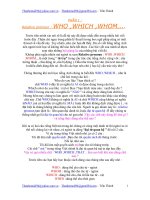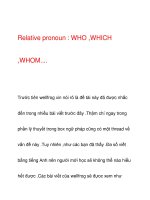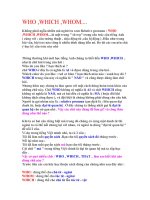58475 relative clause who which whom whose that
Bạn đang xem bản rút gọn của tài liệu. Xem và tải ngay bản đầy đủ của tài liệu tại đây (93.63 KB, 2 trang )
RELATIVE CLAUSES
A)Join these sentences by using “who”or “which”.
1. He’s the accountant. He does my accounts.
He’s the accountant who does my accounts.
2. She’s the nurse. She looked after me.
_____________________________________________
3. They’re the postcards. They arrived yesterday.
_____________________________________________
4. They are the secretaries. They work in our office.
_____________________________________________
5. That’s the magazine. It arrived this morning.
_____________________________________________
6. They are the workmen. They repaired our roof.
_____________________________________________
B)Join these sentences with “who(m)” “which” or nothing.
1. He’s the accountant. You recommend him to me.
He’s the accountant you recommend.
2. She’s the nurse. I saw her at the hospital.
_____________________________________________
3. They are the postcards. I sent them from Spain.
_____________________________________________
4. They are the secretaries. Mr. Pym employed them.
_____________________________________________
5. That’s the magazine. I got it for you yesterday.
_____________________________________________
6. They are the workmen. I paid them for the job.
_____________________________________________
7. That’s the dog! I saw it at the dog show last night.
_____________________________________________
8. They’re the birds. I fed them this morning.
_____________________________________________
C)Join each pair of sentences in three different ways.
1. He’s the man. I sent money to him.
a. He’s the man to whom I sent the money.
b. He’s the man who(m) I sent the money to.
c. He’s the man I sent the money to
2. She’s the nurse. I gave the flowers to her.
a.____________________________________________
b.____________________________________________
c. ____________________________________________
3. That’s the chair. I sat on it.
a.____________________________________________
b.____________________________________________
c. ____________________________________________
4. He’s the boy. I bought this toy for him.
a.____________________________________________
b.____________________________________________
c. ____________________________________________
5. That’s the building. I passed by it.
a.____________________________________________
b.____________________________________________
c. ____________________________________________
6. They’re the shops. I got these from them.
a.____________________________________________
b.____________________________________________
c. ____________________________________________
D)Join these sentences using “whose”
1. He’s the customer. I lost his address yesterday.
He’s the customer whose address I lost.
2. She’s the novelist. Her book won first prize.
_____________________________________________
3. They are the children. Their team won the match.
_____________________________________________
4. You are the expert. We want your advice.
_____________________________________________
5. I am the witness. My evidence led to his arrest.
_____________________________________________
6. She’s the woman. The film was made in her house.
_____________________________________________
E) Join each pair of sentences together to make one sentence, using who or that.
Write the second sentence as a relative clause.
1 This is the woman. She gave me my first job.
This is the woman who gave me my first job.
2 He picked up the book. It was on the desk.
He picked up the book that was on the desk.
3 The meal was delicious. Ben cooked it.
_____________________________________
4 She's the woman. She telephoned the police.
_____________________________________
5 He's the person. He wanted to buy your house.
_____________________________________
6 We threw out the computer. It never worked properly.
_____________________________________
7 This is the lion. It's been ill recently.
_____________________________________
8 The man was badly injured. He was driving the car.
_____________________________________
9 The children broke my window. They live in the next street.
_____________________________________
10 They sold the cat. It was afraid of mice.
_____________________________________
11 This is the chair. My parents gave it to me.
_____________________________________
12 I've applied for the job. You told me about it.
_____________________________________
13 We're looking for the ball. We were playing with it.
_____________________________________
14 The man was holding the gun. We saw him.
_____________________________________
15 I'm going to speak to the mechanic. He repaired my car.
_____________________________________
16 The TV programme was very sad. I watched it last night.
_____________________________________
17 The girl had red hair. I saw her.
_____________________________________
18 That's the woman. I was telling you about her.
_____________________________________
F)Decide whether the relative pronoun is a subject pronoun or an object
pronoun.
1. Do you know the girl who I danced with?
2. Do you know the girl who danced with me?
3. The apples that are lying on the table are bad.
4. The apples that we bought in the shop are bad.
5. We will stay at a hotel which is not far from the beach.
6. We will stay at a hotel which my friend has recommended to us.
7. This is the man who Barbara visited in Scotland.
8. This is the man who lives in Scotland.
G)Decide whether the relative pronouns must be used or not.
1. A calendar is something which tells you the date.
2. Strikers are soccer players who try to score goals for their team.
3. Jane is a person who everybody likes.
4. A stamp is something which you put on a letter if you want to send it.
5. The Thames is a river which runs through London.
6. Cheese is food which mice like eating.
7. A racket ist something which you use to hit a ball when you play tennis or
badminton.
8. Socks are things which you wear on your feet.
9. A guide is a person who shows tourists around around a place.
10. Love is a feeling which nobody can describe.
H)Complete the blanks with appropriate relative adverb.
1. This is the station________Emily met James.
2. July and August are the months________most people go on holiday.
3. Do you know the reason________so many people in the world learn English?
4. This is the church_______Sue and Peter got married.
5. Edinburgh is the town_______Alexander Graham Bell was born.
6. 25 December is the day_______children in Great Britain get their Christmas
presents.
9. A famine was the reason_______so many Irish people emigrated to the USA in
the 19th century.
10. A greengrocer's is a shop_______you can buy vegetables.
11. The day_______I arrived was very nice.
12. A horror film was the reason_______I couldn't sleep last night.
I)Study the situations and then decide whether the following relative clauses are
defining or non-defining.
1. I have three brothers.
a. My brother who lives in Sidney came to see me last month.
b. My brother, who lives in Sidney, came to see me last month.
2. I have one sister.
a. My sister who is 25 years old spent her holiday in France.
b. My sister, who is 25 years old, spent her holiday in France.
3. Bob's mum has lost her keys.
a. Bob's mum who is a musician has lost her car keys.
b. Bob's mum, who is a musician, has lost her car keys.
4. My friend Jane moved to Canada.
a. My friend Jane whose husband is Canadian moved to Canada last week.
b. My friend Jane, whose husband is Canadian, moved to Canada last week
5. Mr Robinson is very famous.
Mr Robinson whom I met at the trade fair is a famous inventor.
Mr Robinson, whom I met at the trade fair, is a famous inventor.
6. Tamara has two cats. Both of them are black.
Tamara's two cats which can play outside are black.
Tamara's two cats, which can play outside, are black.
7. We are on holiday. Yesterday we visited a church.
The church which we visited yesterday is very old.
The church, which we visited yesterday, is very old.
8. We are on holiday. Yesterday we visited a church.
St. Mary's Church which we visited yesterday is very old.
St. Mary's Church, which we visited yesterday, is very old.









